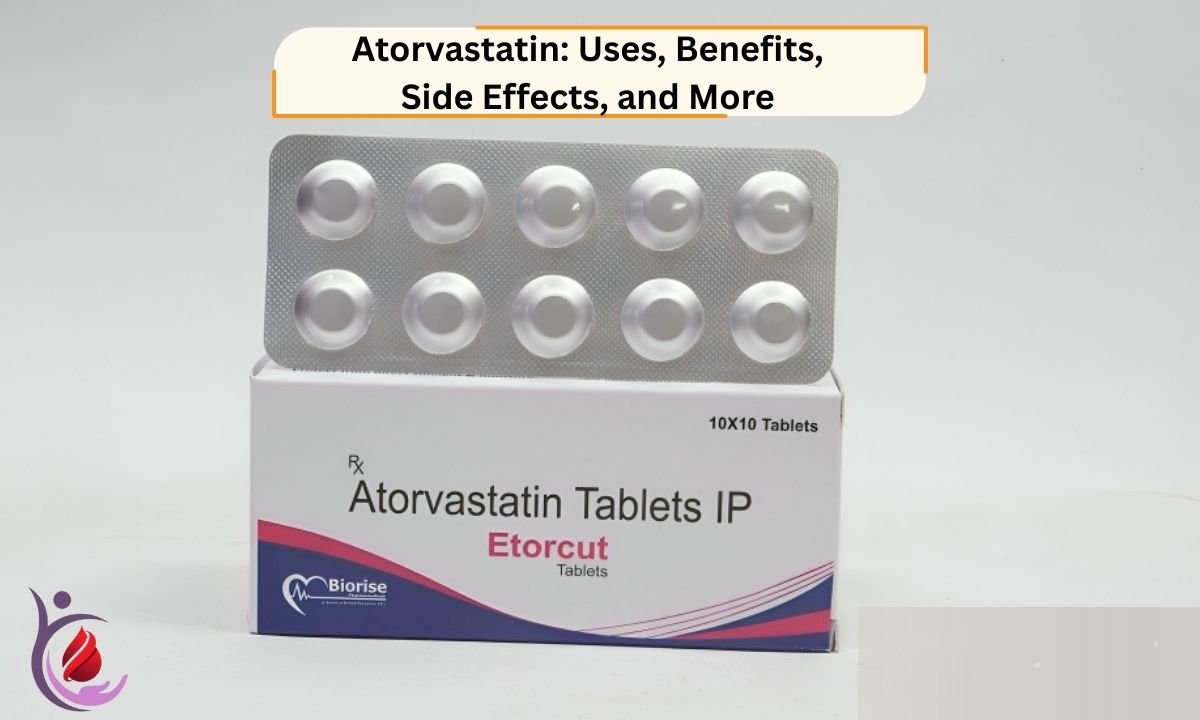Atorvastatin: Uses, Benefits, Side Effects, and More
Atorvastatin is one of the most widely prescribed medications for managing high cholesterol and reducing the risk of cardiovascular diseases. Belonging to the class of drugs called statins (HMG-CoA reductase inhibitors), Ator vastatin helps lower “bad cholesterol” (LDL) and triglycerides while increasing “good cholesterol” (HDL) in the blood. If you’ve been prescribed this medication or are considering it as part of your heart health plan, understanding how it works, its benefits, and potential side effects is crucial.
What Is Atorvastatin?
Atorvastatin is a lipid-lowering medication primarily used to manage hypercholesterolemia (high cholesterol) and dyslipidemia. By reducing LDL cholesterol and triglyceride levels in the bloodstream, it helps decrease the risk of heart attacks, strokes, and other cardiovascular complications.
This medication works by blocking the enzyme HMG-CoA reductase in the liver, which is responsible for producing cholesterol. As a result, the liver makes less cholesterol and absorbs more LDL cholesterol from the blood, lowering overall cholesterol levels.
Common Brand Names of Atorvastatin
- Lipitor
- Atorva
- Tonact
- Storvas
- Atorvastatin Calcium tablets (generic versions)
Medical Uses of Atorvastatin
1. Lowering LDL Cholesterol
Low-density lipoprotein (LDL) cholesterol is often called “bad cholesterol” because it builds up in the arteries, forming plaques that restrict blood flow. Atorva statin helps reduce LDL levels significantly, minimizing plaque formation.
2. Increasing HDL Cholesterol
High-density lipoprotein (HDL) is “good cholesterol” because it carries cholesterol from the arteries back to the liver for elimination. Ator vastatin modestly increases HDL levels, further protecting against heart disease.
3. Reducing Triglycerides
High triglycerides increase the risk of heart disease and pancreatitis. Ator vastatin lowers triglyceride levels, contributing to improved lipid balance.
4. Preventing Cardiovascular Events
Ator vastatin is often prescribed to patients with a history of heart attacks, strokes, or other forms of atherosclerotic cardiovascular disease (ASCVD) to prevent recurrence. It also benefits patients with diabetes or multiple risk factors for heart disease.
5. Treating Familial Hypercholesterolemia
This genetic condition leads to dangerously high cholesterol levels at an early age. Ator vastatin is frequently used as part of long-term therapy to manage cholesterol levels in affected individuals.
How to Take Atorvastatin?
- Dosage: Ator vastatin is usually prescribed in doses ranging from 10 mg to 80 mg once daily.
- Timing: It can be taken at any time of the day, with or without food, but should be taken at the same time daily for consistency.
- Lifestyle support: A heart-healthy diet, regular exercise, weight control, and avoiding tobacco use are essential to maximize its benefits.
- Missed dose: If you miss a dose, take it as soon as you remember. If it’s almost time for your next dose, skip the missed one—do not double dose.
Possible Side Effects of Atorvastati
While Atorvastatin is generally well-tolerated, some people may experience side effects. These may include:
Common Side Effects:
- Headache
- Nausea or indigestion
- Muscle aches or joint pain
- Diarrhea
- Fatigue
Serious Side Effects (Rare):
- Severe muscle pain or weakness (may indicate rhabdomyolysis)
- Liver problems (jaundice, dark urine, upper abdominal pain)
- Allergic reactions (rash, itching, swelling)
If you experience severe or persistent symptoms, it’s important to contact your healthcare provider immediately.
Precautions and Warnings
- Liver Conditions: Atorva statin is not recommended in patients with active liver disease or unexplained persistent liver enzyme elevations.
- Alcohol Use: Excessive alcohol intake may increase the risk of liver side effects.
- Drug Interactions: Some medications, such as antibiotics (clarithromycin), antifungals (itraconazole), HIV protease inhibitors, and certain heart medications, may interact with Ator vastatin. Always inform your doctor about any medicines or supplements you are taking.
- Pregnancy and Breastfeeding: Atorva statin should not be used during pregnancy or breastfeeding as cholesterol is essential for fetal development.
- Grapefruit Juice: Large amounts of grapefruit juice may increase Atorva statin levels in the blood, increasing side effect risk.
Atorvastatin vs. Other Statins
Atorvastatin is more potent than some other statins such as Simvastatin or Pravastatin, meaning it can lower LDL cholesterol more effectively at comparable doses. It also has a longer half-life, allowing for more flexible dosing schedules. However, like all statins, it must be chosen based on individual health profiles and cholesterol goals.
Monitoring During Therapy
Patients on Atorvastatin may need periodic blood tests to monitor:
- Lipid profile: To check whether cholesterol targets are being met.
- Liver function tests: To ensure the drug is not harming the liver.
- Creatine kinase levels: In rare cases where muscle pain is severe, this test helps rule out muscle damage.
Lifestyle Tips to Complement Atorvastatin
While Atorvastatin is highly effective, medication works best when paired with healthy lifestyle choices:
- Diet: Focus on a diet rich in fruits, vegetables, whole grains, lean protein, and healthy fats. Limit saturated fats, trans fats, and added sugars.
- Exercise: Engage in at least 150 minutes of moderate-intensity exercise weekly.
- Weight Management: Maintain a healthy body weight to reduce strain on your heart.
- Quit Smoking: Tobacco use accelerates plaque formation in arteries.
- Limit Alcohol: Excessive drinking can worsen cholesterol levels and harm the liver.
Key Takeaways
- Atorvastatin is a statin drug used to lower LDL cholesterol, increase HDL cholesterol, and reduce triglycerides.
- It significantly lowers cardiovascular risk, particularly in patients with heart disease, diabetes, or high cholesterol.
- Side effects are usually mild but should be monitored, especially muscle pain or liver problems.
- Lifestyle changes remain essential, even when taking medication, to achieve optimal heart health.
- Always take Ator vastatin as prescribed and do not discontinue without consulting your doctor, even if you feel well.
Final Words
High cholesterol often develops silently, without symptoms, but can lead to life-threatening complications if untreated. Atorvastatin has proven to be a cornerstone therapy in modern cardiovascular medicine, saving millions of lives worldwide by controlling cholesterol levels and preventing heart attacks and strokes. When combined with healthy lifestyle habits and regular medical checkups, Ator vastatin can help you live a longer, healthier life.
Also Read About –

